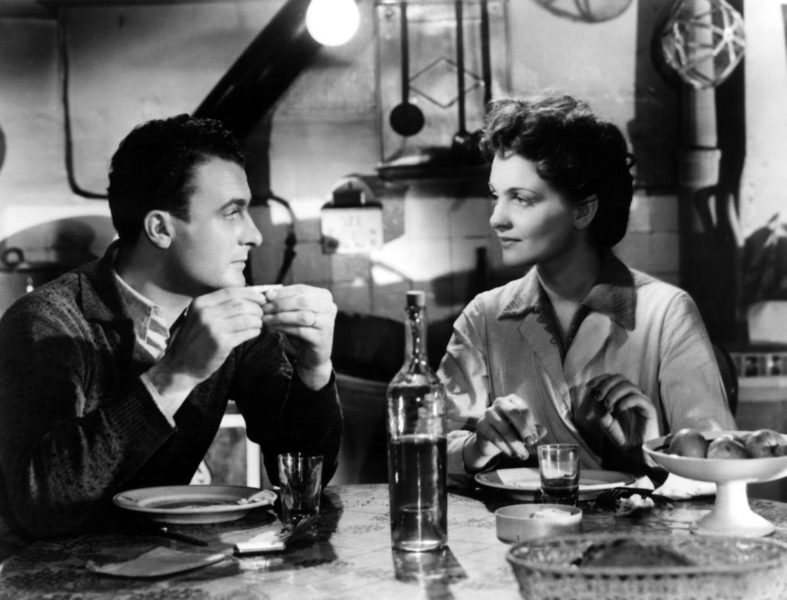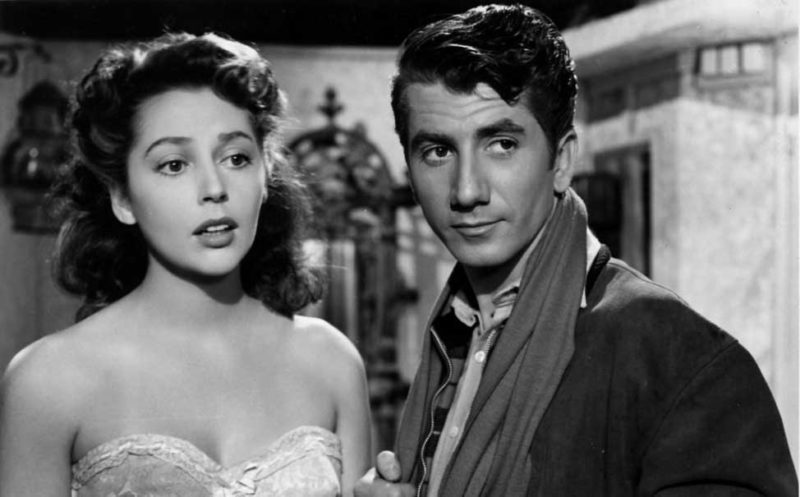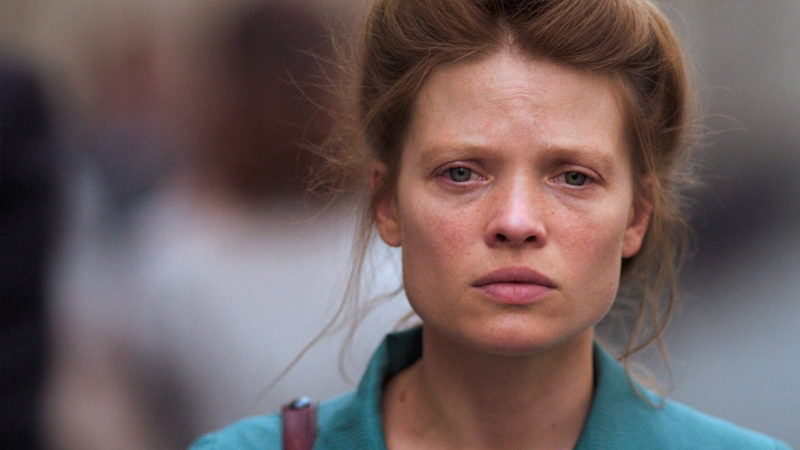Antoine and Antoinette “Are you so orderly?” Edouard asks his wife Caroline when she boasts of being able to find anything in their small, cluttered apartment. “No,” she replies gaily, “I have flow—it’s much better.” Flow is precisely what the early works of Jacques Becker have: a fluid and propulsive current of motion and energy that gives you the feeling not so much of watching, as of being swept up in something. Just as Caroline (Anne Vernon) believes that her intuitive spontaneity enables her to locate household items (in this case, her husband’s missing waistcoat), Becker’s liberated, organic style allows for very delicate, accurate, scalpel-fine observations of behavior and the details of everyday life. Edouard and Caroline (1951) is the third film in what has been dubbed the “Youth Trilogy,” along with Antoine and Antoinette (1947) and Rendezvous in July (1949). There are no formal connections between the plots and characters of these three titles, but each follows young Parisians struggling to realize their ambitions, as they absorb the frustrations and joys of daily life, and—of course—the ups and downs of their amours. With their exhilarating freshness, casual use of location shooting, brisk and bracingly sharp cutting, and deceptive feel of being unstructured records of life, these films display many of the innovations that would be attributed a decade later to the New Wave directors (who admired Becker and saw him as a forerunner). But Becker, who had served as an assistant to Jean Renoir in the 1930s, remained loyal to his mentor’s humanism; the eye that he turns on his characters is as warm as it is clear, as tolerant as it is scrupulous. Film Forum’s reopening on August 1, after a three-month closure for renovations, was doubly welcome since they kicked off with a complete retrospective of Becker’s too-brief career (he died in 1960 when he was only 53), including movies rarely if ever screened in the United States. Antoine and Antoinette was a revelation when it first resurfaced at Film Forum in a 2013 Rialto Pictures reissue. The title couple is working class, unlike the bourgeois bohemians of the other two entries in the Youth Trilogy, and the film reflects Becker’s left-wing sympathies in its depiction of the petty bossing and predatory harassment the proletarian heroes must endure. Antoine (Roger Pigaut) works in a printing shop, manning a machine that slices the edges off book blocks. The blades fall like guillotines and white strips of paper fall away. Narrative cinema in the Hollywood studio era was trimmed just as ruthlessly of anything extraneous to the story. One of Becker’s trademarks is his subtly radical interest in just those things that are usually elided, the space around events, the in-between moments of nothing happening—whether it is Jean Gabin’s middle-aged gangster brushing his teeth and fixing up a bed in Touchez Pas au Grisbi (1954), or Antoinette (Claire Maffeï) ironing a dress while her husband fiddles with a ham radio. People call this kind of thing a “slice of life,” as though it were a simple matter of breaking off a hunk of reality and serving it up. But Becker is doing something far trickier and more virtuosic: constructing moments of apparent ordinariness that become riveting, and mundane images that are inexplicably moving, as when Antoinette leans out the window in her nightgown to watch her husband cycle off to work over the cobblestones in the bright mist of a winter morning. The film is ebullient in its rhythms, crystalline in its details. When Antoine wants to check the winning lottery numbers against a ticket his wife has bought, he has to recover the cut sections of the newspaper he’s been using to line his shoes. When he goes to redeem the winning ticket and finds he has lost it, the unbearable pressure of the moment is underscored by the penetrating, tuneless chords banged out by a blind piano tuner. The second half of the film becomes an intricately plotted tease, with the losing and finding and losing of the ticket that represents the couple’s dream of escape and freedom. The lottery exemplifies randomness, the sheer chance that plucks this one couple out of the crowd, out of the impersonal portraits spat out by the passport-photo booth were Antoinette works, or the hordes of soccer fans with whom they spend their Sunday. In a freighted moment, Antoine asks his wife whether she could have fallen in love and been happy with someone else. She never answers. There are touches of humor in almost all of Becker’s films, but Edouard and Caroline is one of his purest comedies. It also contains some very ugly moments, all the more uncomfortable because they are smuggled in among so much charm and so many belly laughs, which come largely courtesy of Vernon, an inspired and natural comic actress who also happens to be a radiant beauty. Her smallest gestures and expressions, as she appraises and alters a frumpy evening gown, are hilarious. Unfortunately her husband (Daniel Gélin) lacks fashion sense. Having endured the humiliation of having to borrow a waistcoat from Caroline’s snobby cousin (Jean Galland, in yet another brilliant comic turn), Edouard throws a childish fit when he sees the transformed gown, and slaps his wife. Their constant sparring is partly class-based; he is a poor but egotistical pianist while she is a slightly dizzy debutante. The whole movie takes place over a single evening, as they prepare for a high-society party at which Edouard is to play and hopefully attract patrons. Squabbles, embarrassments, flirtations, tantrums, and all kinds of bad behavior swirl along as fluently as the Chopin Edouard plays. His strategy for reconciliation comes disturbingly close to marital rape, leaving a bitter taste at the end of an effervescent delight, but part of Becker’s humanism was that he never idealized his characters.
Edouard and Caroline Gélin also stars in Rendezvous in July as Lucien, an ambitious young man doggedly determined to lead an expedition to make an ethnographic film in Africa. To call him a protagonist would be misleading; this is a film about a group of friends, a crowd, and perhaps even more about a moment and an age. Becker captures a particular burning urgency of youth, in all its solipsism and over-seriousness, and also in its rambunctious vitality, its sense of infinite possibilities and frantic anxiety that those possibilities will slip away. While Lucien makes the rounds of officials seeking funding for his project, his handsome friend Roger (Maurice Ronet, in his film debut) plays trumpet in a basement jazz club. The girls they are dating, Christine (Nicole Courcel) and Thérèse (Brigitte Auber), get cast in a play and contend with the lecherous interest of other men and their boyfriends’ ensuing jealousy. After a deceptively sedate opening at a family luncheon, the film takes off with a snappily edited series of phone calls. People are always rushing up and down stairs; the friends zoom around Paris in an amphibious duck boat, and finally take wing in an airplane. They pack a bohemian loft filled with surrealist art for a party punctuated by outbursts and breakdowns. The jazz club (peopled with real star musicians including Rex Stewart and Mezz Mezzrow) is a heaving, pulsating mass of bodies, parting just enough to allow goateed beatniks in flannel shirts to squeeze in, or a few couples to jitterbug wildly. Rarely does Becker encourage us to identify with a single person. There are men in his films (they are always men) who see themselves as separate, superior, alone in their genius—as Lucien tends to do, berating his friends for their cowardice and laziness when they hesitate to join his expedition. Or the painter Amedeo Modigliani in The Lovers of Montparnasse (1958), who, even played by the beautiful, romantically sensitive Gérard Philipe, comes off as mostly a pill in his stubborn, arrogant self-destructiveness. Or like Philippe Clarence (Raymond Rouleau), the temperamental, perfectionist dress designer in Falbalas (1945), a movie that seems unquestionably to have been an inspiration for Paul Thomas Anderson’s Phantom Thread. Lording it over a staff of overworked women, Philippe burns through muses, filling a creepy closet with dresses he designed for each of his lovers, labeled with the start and end dates of their liaisons. When one of his conquests (Micheline Presle) turns the tables on him, he cracks, unable to face rejection and emotional cruelty. The film’s dazzlingly shot denouement accounts for its stunning opening shot, of a man lying dead in a wintry garden, one arm around a mannequin in a wedding gown. Becker, who co-wrote most of his films, was adept at forcing us to see both sides in a relationship, apportioning both blame and sympathy evenhandedly. He was also a master of the choreography—psychological and physical—of groups, as demonstrated in his final masterpiece, Le Trou (1960). Again, there is no central character, or rather there is a multi-headed one: the five men sharing a prison cell. They sleep together on the floor, sit around eating rice pudding, while away the hours assembling cardboard boxes, and—in riveting long takes—tunnel out of their cell by pounding through the concrete with iron bars. Everything depends on the men’s ability to work together and trust one another. There is little verbal development of their characters or backstories. Becker rarely used any of the common devices for evoking interiority or subjectivity. His attention was devoted to behavior, gesture, action, and interaction, yet there is depth of feeling in even his lightest touches.
Memoir of War This aspect of Becker’s style creates a striking contrast with a new release also playing at the Film Society of Lincoln Center and Film Forum in August, Emmanuel Finkiel’s Memoir of War, adapted from Marguerite Duras’s semi-autobiographical book The War: A Memoir. The film’s French title, La Douleur (“Pain”) is more fitting, since this is not so much a movie about the Second World War as it is about the individual experience of suffering. What interests the director most is not Duras’s activities in the Resistance, or the factual details of how she and other Parisians got through the Occupation; it is the extremity of her psychological state; her unreliability as a narrator; and the ways in which she resists sympathy through her overwhelming self-absorption and neurotic ambivalence. Finkiel’s script focuses tightly on Marguerite’s response to the arrest and deportation of her husband, Robert Antelme (Emmanuel Bourdieu): the protracted and mind-warping agony of waiting for news of him, and then for his return after the Liberation. The opening scene pairs extreme close-ups of Mélanie Thierry, who plays Duras, with her voiceover, which continues throughout the film. The camera never strays far from Thierry, though it often watches her from behind; sometimes she even appears twice on screen, watching herself. The other characters are subordinate satellites, though the two main male actors, Benjamin Biolay and Benoît Magimel, flesh out their roles with nuanced physical performances. Magimel plays a collaborationist official with whom Marguerite shares a strange connection; each is ostensibly trying to use the other to get information or leverage, but they seem driven far more by his star-struck crush and her queasy pleasure in leading him on. Meanwhile, her relationship with the brooding Dionys Mascolo (Biolay), a fellow member of her Resistance cell, gradually comes to the fore. At first he seems to be a supportive friend, though his sensual gaze and tender caresses hint at more; eventually it becomes evident that they are lovers. In reality, their affair began even before the arrest of Duras’s husband, whom she later divorced to marry Dionys. Finkiel has said that because Duras is completely evasive about this relationship in her book, he chose to treat it obliquely, thus making her opacity the subject. The complication of Marguerite obsessively waiting for her husband’s return while carrying on with another man is only one element of her less-than-heroic presentation. Thierry’s unsparing performance highlights her ingrown remoteness, nervous irritability, and defeatism—her refusal, in general, to feel the right things or act the right way. Dionys, who frequently orders her to pull herself together, sums it up when she hysterically insists that she does not want to see her husband when he finally returns, near death, from Dachau: “What is more precious? Robert, or your own grief?” Marguerite encounters others whose pain is greater than hers—the mother of a Jewish girl taken to the camps; skeletal survivors from Buchenwald—and the film includes moving scenes of her being pulled out of her interiority to recognize the reality of others. But its lovely visuals, often melting into a blur, and its densely layered voiceover, side with subjectivity to a degree that can be alienating. Jacques Becker, who spent time in a German POW camp, never dealt directly with the War in his films, though he made his first feature, Dernier Atout (1942), under the Occupation, and his second, Goupi Mains Rouges (1943), shares some tendencies with Clouzot’s Le Corbeau, from the same year, in its grotesquely unflattering if blackly funny portrait of a rural French family. Becker’s postwar films celebrate a young and unscarred generation and a rich, revitalized Frenchness. They are filled with concrete details recording what it was like, for instance, to be a ticket-seller in the Paris Metro in 1947. These details give a powerful sense of immediacy, of being here and now—even when the here and now is 1890s France, as it is in Casque d’Or (1952). The inner life of his characters comes out not in dialogue or voiceover, subjective or expressionist visuals. It is there in the way his people eat, drink, dance, play music, and work; in a simple wink, a waltz, a kiss, a slap. It is in their way of being together, the rhythm of their movements, their flow. Imogen Sara Smith is the author of In Lonely Places: Film Noir Beyond the City and Buster Keaton: The Persistence of Comedy, and has written for The Criterion Collection and elsewhere.


